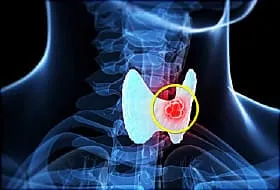
While it may come as a shock to learn you have papillary thyroid carcinoma, keep in mind that it's a slow-growing cancer that usually can be cured.
What Are the Symptoms?
Often, you won't have any. You might only find out about it because of an imaging test for another problem. Or, during a routine physical exam, your doctor might just happen to feel a lump, called a nodule, on your thyroid.
Nodules are growths that may be solid or filled with fluid. They're very common and often don't cause any trouble. But about 1 in 20 are cancer.
As a nodule gets bigger, you may start to have symptoms like:
- Lump in your neck that you can see or feel
- Hard time swallowing (you might have pain or find that food or pills get stuck)
- Sore throat or hoarseness that doesn't go away
- Swollen lymph nodes in your neck
- Trouble breathing, especially when you lie down
What Causes It?
Doctors aren't sure. It's most common in women under age 40.
You may have a higher chance of getting papillary thyroid carcinoma because of things like:
Certain genetic conditions. Diseases like familial adenomatous polyposis (FAP), Gardner syndrome, and Cowden disease can raise your odds.
Family history. In a small number of cases, papillary thyroid carcinoma runs in the family.
Radiation therapy. If you had radiation to treat cancer for another condition when you were a child, it can raise your chances.
Gender. It's much more common in women than men, but doctors aren't sure why.
How Will My Doctor Test for It?
You'll need a few different tests to see if a nodule is cancer.
Physical exam. Your doctor will feel for unusual growths in your neck and ask about any symptoms you might have.
Blood tests. You may get your thyroid hormone levels checked. This won't tell you if you have cancer, but it gives more information about how your thyroid is working.
Ultrasound. You'll get this test, which uses sound waves to make a picture of things inside your body, to learn more about nodules you have. Your doctor will find out about their shape, size, and other features. That will give important clues to decide how much of a problem they are.
Biopsy. Your doctor will use a very fine needle to take a sample of the nodule to test for cancer. Typically, the most you'll feel during it is a small pinch.
You'll likely get this done for any nodule that's bigger than 1 centimeter (about half an inch). Nodules with calcium buildup, lots of blood vessels, or without clear borders raise red flags. So do unusual-looking nearby lymph nodes -- bean-shaped organs that help fight infections.
How Is It Treated?
If the cancer is very small, your doctor may suggest you just keep an eye on it with regular ultrasounds. When you do need treatment, it'll likely go like this:
Surgery. In most cases, your doctor removes the entire thyroid, along with any lymph nodes that look to be problems.
If the cancer is small, you might choose to have only part of your thyroid removed. Even in this case though, many doctors think it's better to take it out completely. It can make follow-up care work better and lower the chances that cancer comes back.
Radioactive iodine (RAI) ablation. Surgery alone may cure the cancer, so not everyone needs this step. After the operation, your thyroid gets tested. The results will help you and your doctor decide if you might need RAI ablation to keep cancer from returning.
This is typically a one-time treatment where you take a pill with radioactive iodine. Any leftover thyroid cells take in the iodine, which then kills them. It doesn't usually have side effects, since only thyroid cells soak it up.
You typically get RAI ablation if you had nodules bigger than 4 centimeters or if the cancer:
- Grows beyond the thyroid
- Moves into the lymph nodes
- Spreads to another part of your body
Thyroid hormone pills. You start taking these after surgery. It gives your body the thyroid hormones that you no longer make on your own, since your thyroid has been removed. You'll typically take one pill a day for the rest of your life.
The pill also stops your body from making thyroid stimulating hormone (TSH). This is a hormone from your pituitary gland that would normally tell your thyroid to start pumping out hormones.
Stopping TSH is a key part of treatment because if you have any thyroid cells left, TSH could trigger their growth. And that would raise the odds that cancer could return.
Will I Need Follow-Up Care?
Yes. At first, you'll get blood tests every few months to check your thyroid hormone levels and get the dose right for your medicine.
Once everything has evened out, you'll get an ultrasound and blood tests every 6-12 months. This is to check that you still have the right dose for your meds and to make sure the cancer hasn't come back.

